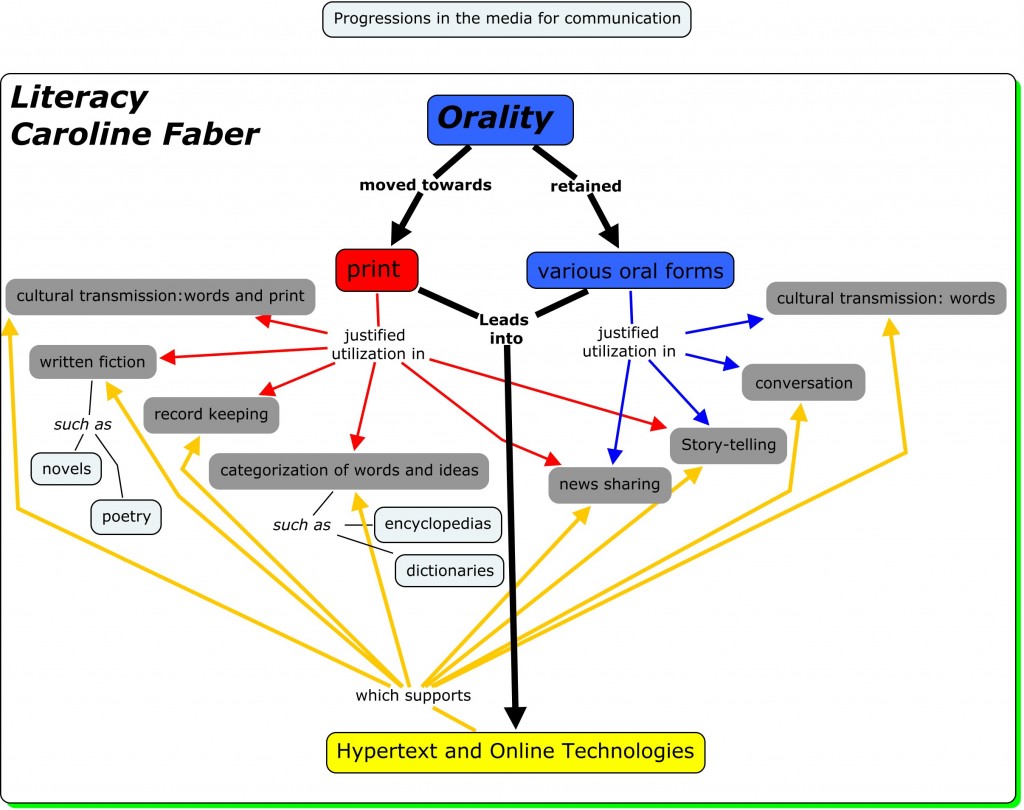Yesterday, today and tomorrow
I feel like in the past few months of the course my original ideas on communication technologies have been completely torn apart at times, stretched out to accommodate new ideas at others, and turned around, upside down and shaken out when I have least expected it. I came into the course with specific notions of orality, literacy, and hypertext/social technologies. I realized very quickly that my ideas were quite closed, and desperately needed to be challenged, opened up for debate, and in some cases, revamped in their entirety.
Projects and discussions in the course offered great theoretical thought provoking materials, such as Ong and Bolter ‘battling it out’ for a win on two different sides of the arguments regarding technological determinism. Throughout each stage of the course I found myself stopping frequently to consider the information, search for further reading on topics of interest, and eager to begin research for commentaries which would help me to come to terms with issues that left me with more questions than answers.
Orality and Literacy
Considering a world without literacy was an incredibly rich experience. I had never considered literacy to be technology, and had not thought in depth about the implications of print to a society or culture. Questions regarding the effects of literacy seemed to fall out of the pages as I read about changes in our society over the past few thousand years as communication moved from orality, to a combination of orality and literacy(through the lifespan of papyrus scrolls, codex, the printing press), to more modern technologies (hypertext and word processing faculties). Real-world examples came to mind in my own area, of the First Nations cultures in my community that have been, effectively, ripped from orality and heaved headfirst into literary traditions. Where many, if not most, cultures have had thousands of years to adapt, what happens to cultures that are expected to openly adapt, and adjust to the dominant literary traditions in less than a century? There are still First Nations people alive today that can remember a time of pure orality.
New Technologies
I began to realize that communication technologies affect our lives as we choose to (or are coerced/forced/manipulated) into adopting them. We take on new technologies, realize they ease our daily lives and as a result, develop a perceived need for them and then work to develop increasingly efficient and effective technologies that we can no longer seem to live without. I wonder at how our world will change as a result of online technologies including but not limited to social media technologies and hyperlinking trends. We seem to be in the midst of a huge revolution in an Internet presence that is simultaneously everywhere and nowhere. This presence that we can not see or physically feel, is affecting our society in exponentially increasing degrees. Michael Wesch’s, Youtube video, Information R/evolution really brings to light the dramatic changes that have already occurred since the introduction of these new technologies.
Branching occurs whenever a new technology is introduced. Literacy has branched off from oral traditions and new technologies are creating yet another branch in the media of communication. In a world where “social media” and Web 2.0 are new terms arising from technologies of the recent few years, the rate of change is exceptionally fast, as new technologies build upon old, answering the needs of current society. As Francois de la Rochefoucauld reminds us, “The only thing constant in life is change.”

Please take a look at the chart I have attached which provides a general overview of some ways the transition from Orality to Print to Hypertext and Online technologies has occurred. It provides an overview of the branching off which has occurred as a result of these three technological movements. In their book, Remediation: Understanding New Media, Bolter and Grusin state, “Our one prediction is that any future media will also define their cultural meaning with reference to established technologies. They will isolate some features of those technologies…and refashion them to make a claim of greater immediacy.” (271)
References:
Bolter, J. and Grusin, R. (2000) Remediation: Understanding new media. Accessed at: http://mitpress.mit.edu/catalog/item/default.asp?ttype=2&tid=3468&mode=toc
Theexist.com. Accessed at: http://thinkexist.com/quotation/the_only_thing_constant_in_life_is/196458.html
Wesch, M. Information R/evolution. Accessed at: https://www.youtube.com/watch?v=-4CV05HyAbM


0 comments
Kick things off by filling out the form below.
You must log in to post a comment.